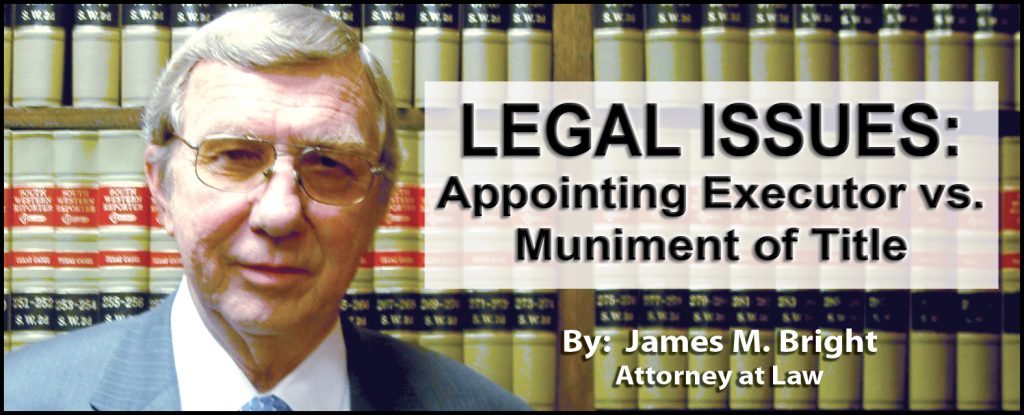The following is provided for informational purposes only and is not, nor should it be construed as legal advice.
When offering a Will for probate, there are two primary approaches for doing so. The first is to petition the court to approve appointment of an executor (usually the executor named in the Will), and the second is to petition the court to admit the Will to probate as a “muniment of title.” Both of these approaches are dependent upon and assume that there is a valid Will. If there is no Will, a very different set of choices is available and is not discussed in this writing.
Before electing which of these approaches is best for a particular circumstance, a few simple questions need to be answered. A nonexclusive list of questions might include:
- Are there any debts owed by the estate that are not secured by real property?
- Does the estate have complex assets?
- Are there any assets for which title is to be cleared that are not in Texas?
“MUNIMENT OF TITLE” – If the answer to all of these questions is “No,” then a muniment of title will probably be recommended as an abbreviated probate procedure which can save you both time and money. In a muniment proceeding, the court hearing the case will cause to be filed in the records of the county in which the probate was filed, a copy of both the original Will and the court order admitting it to probate. This is sufficient record, filed in the real property records, to show ownership of the property passing to the beneficiary of the testator’s Will. You will find that title companies in Texas are very familiar with this type of proceeding and have no problem in issuing title policies based on this record.
If the testator owned real property in multiple counties in Texas, your attorney should file a certified copy of the probated Will and court order in each County where real property is located. It is also worthy of note that if a Will is probated within four years following the death of the testator, a muniment of title proceeding may be available as a cost-savings device, but if a Will is probated more than four years following the death of the testator, a muniment of title is the only practical method of probating the Will. Although this method of probating the Will is exclusive more than four years after the death of the testator, it is considerably more difficult to do so after four years because of possible family dynamics.
You must understand, however, that a muniment of title procedure is a product of Texas law. In certain isolated cases, particularly in dealing with property titled out-of-state, this method of probate may be unfamiliar to the bank officers, attorneys or other stakeholders in those states, and therefore may result in delays in releasing funds or other assets which are held by entities outside of Texas. This is particularly true of real property devises which will almost certainly require being resubmitted for probate of those assets in the other states.
EXECUTOR – If the answer to any of the above questions is “Yes,” then appointment of an executor will probably be recommended. (For purposes of this article, the executor is assumed to be an independent executor.) Discussions of independent versus dependent executor are discussed in other articles published on earlier dates, but are still available for review on the website – www.houstontxprobate.com. In the most general terms, the reason that we appoint an executor to administer an estate is so that they can pull together all of the assets of the estate, pay or settle any debts of the estate and distribute the remaining portion to the beneficiaries named in the Will. The executor is clothed with the authority to deal with the testator’s property very much as the testator could have done during his/her lifetime. This authority is evidenced by “letters testamentary” which are issued by the County Clerk pursuant to an order of the court.
When an executor is named, title to real property does not pass automatically as it does in the muniment of title. An executor who is settling the estate of the testator may do so through an “executor’s deed.” Depending on the terms of the Will, the executor may be required to sell the real property in question and distribute the funds to the named beneficiaries in the Will or he/she may be required to execute an executor’s deed passing an undivided portion of the real property to each of the named beneficiaries. Once ownership is established in multiple beneficiaries, then it becomes their responsibility to decide what they want to do with the real property. If they wish to sell it, then they all must agree; if they do not wish to sell, then they will hold the title jointly until they agree or the estate is partitioned by court order.
The decision of how you settle a loved one’s estate is best made after you have had an opportunity to discuss the various approaches with an attorney of your choice.
James Bright has been admitted to practice before the Federal Courts for the Southern District of Texas and Eastern District of Texas as well as all of the Justice Courts, Probate Courts, County Courts at Law, District Courts, Courts of Appeal and Supreme Court for the State of Texas. He maintains an office in Houston and by appointment another at 208 McCown Street in the heart of historic Montgomery. Contact may be made by telephone (936) 449-4455 or (281) 586-8277. For more information about wills or probate in Texas, please see-www.houstontxprobate.com
IF YOU WISH TO SUGGEST A TOPIC FOR THIS COLUMN, SEND TO:
JAMES M. BRIGHT
14340 TORREY CHASE BLVD., SUITE 150
HOUSTON, TEXAS 77014
Email: topics@houstontxprobate.com
